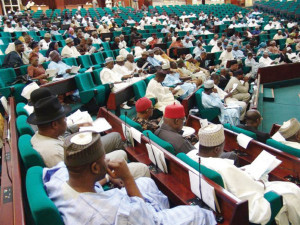
ACCUSTOMED to engaging in proxy battles, the House of Representatives is at it again with its decision to amend the Economic and Financial Crimes Commission Act, amid the ongoing onslaught against those who looted the country’s treasury in the last administration. This perfidious undertaking featured in the Seventh National Assembly, and culminated in the decapitation of the EFCC leadership, weakening its operational efficiency until recently.
It raises eyebrows that a House being led and dominated by the All Progressives Congress – the ruling party – has acquiesced to this plain mischief from the opposition. The gavel of the Speaker, Yakubu Dogara, reportedly rammed against the overwhelming voice-vote of lawmakers that opposed the bill’s passage of Second Reading. The bill’s sponsor is Nicholas Ossai, a Peoples Democratic Party lawmaker from Delta State. “(The) EFCC is being criticised with the way they (it) arraign suspects,” he told his colleagues in plenary in a not-so- persuasive debate. Besides, he wants the anti-graft body to be restructured in a way that professional bodies such as the Nigerian Bar Association and Institute of Chartered Accountants of Nigeria will now be involved in its operations. We say no to this. There are eight sections in the EFCC Act being targeted, which will invariably defang it.
The House Leader, Femi Gbajabiamila, and others were right when they argued that the move would ultimately cripple the EFCC. Their reasoned conclusion is situated within the context of the provisions of Section 13 of the Act that give the commission its powers. The provisions include, but are not limited to, the following: power to arrest; identification and tracing of proceeds and property of persons involved in financial crime; prosecution of suspects; and dealing with issues connected with extradition and mutual assistance in criminal matters from friendly countries.
Many politicians are presently facing corruption trials following their admission that they partook in the sharing of the $2.1 billion meant for the procurement of arms to fight the Boko Haram insurgency, masterminded by the erstwhile National Security Adviser, Sambo Dasuki, who is also being tried. Among the beneficiaries are former and serving PDP members of the House of Representatives. A media report on December 20, which has not been refuted, unravelled two bank account numbers with which the funds were funnelled to them. Each ranking lawmaker allegedly received N150 million for re-election expenses in 2015, while a new member got N50 million.
President Muhammadu Buhari’s vow to recover the loot and bring all those involved to book has not resonated well with the opposition. His stubborn devotion to this cause, which is a turning point in the annals of the anti-graft crusade in the country, has pushed some of these elements to go Machiavellian.
A strong and battle-effective EFCC has always seen suspects on trial fighting back through a mixed bag of intrigues. This is what is playing out at the House, as it also did when Nuhu Ribadu and Farida Waziri were EFCC chairmen. The EFCC’s arrest of James Ibori, a former governor of Delta State, by Ribadu in 2009, set off a chain of deleterious events, including revulsion by some lawmakers. Ribadu was not only sent on a compulsory course at the National Institute for Policy and Strategic Studies, Jos, by the powers that be, just to edge him out of office, but was ultimately ignominiously dismissed from the police. He was later reinstated and retired. Again, under Waziri in 2011, the House attempted to amend the EFCC Act to prevent ex-security officers from being chairmen of the commission. Both Waziri and Ribadu were police chiefs.
We believe that any genuine effort to amend the EFCC Act, with a view to strengthening it, will see the parliament interfacing with its leadership first, so as to find out its operational challenges. But the lawmakers never did so. Before Ibrahim Lamorde left office last November, he described in clear terms the main operational obstacle of the commission. He said, “The challenge my colleagues and I are facing, especially in the EFCC and Independent Corrupt Practices and other Related Offences Commission, is the issue of prosecution of corruption, economic and financial crimes in regular courts.” This was at a meeting of heads of anti-graft agencies where they examined the United Nations Convention against Corruption Review; Recommendation and Draft National Anti-corruption Strategy.
Issues such as this and improved funding are what should attract the parliament’s attention; not the way the agency arraigns suspects.
Olisa Metuh, a PDP spokesman, who was arraigned in court last week in handcuffs, might have been Ossai’s veiled reference. Metuh’s case drew the ire of his party and others less acquainted with the nuances of public prosecution. It is normal to handcuff criminal suspects. Security officers have pretty wide personal discretion for when and how to detain a suspect, but must generally be proportionate to the suspected crime or the chain of events leading up to the investigative detention. It is argued that there are several different situations, including but not limited to being arrested, in which security operatives may place people in handcuffs or other restraints without violating their civil rights.
For safety purposes, a court ruled in the United States that handcuffing an occupant during the search of the premises was not a violation of rights. United Kingdom’s Metropolitan Police says you “may be handcuffed (to make sure that you don’t try and escape, hurt a police officer or hurt yourself”. Dominique Strauss-Kahn, a former IMF boss, was handcuffed during his trial for allegedly sexually assaulting a hotel maid in New York in 2011.
Instead of this disguised parliamentary offensive against the EFCC, the House should acutely reflect on why Nigeria’s anti-graft crusade is not as successful as those of Singapore and other countries that have taken the corruption fight seriously. Its unqualified support for government’s effort to deal with the scourge is what is required of it; not this distraction in amending the commission’s law.
END

Be the first to comment